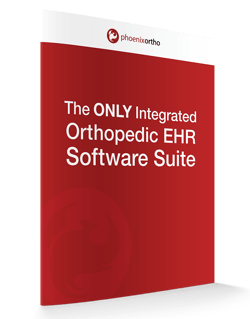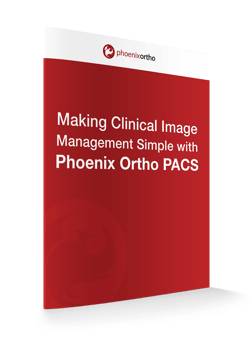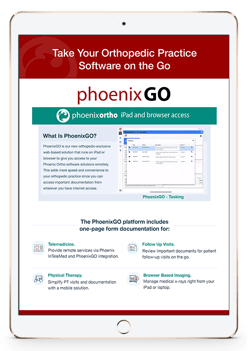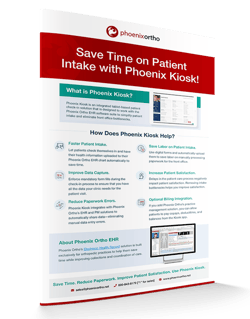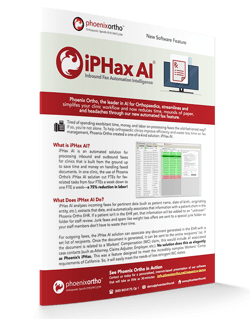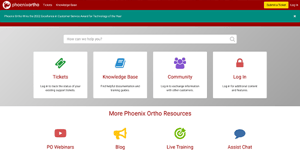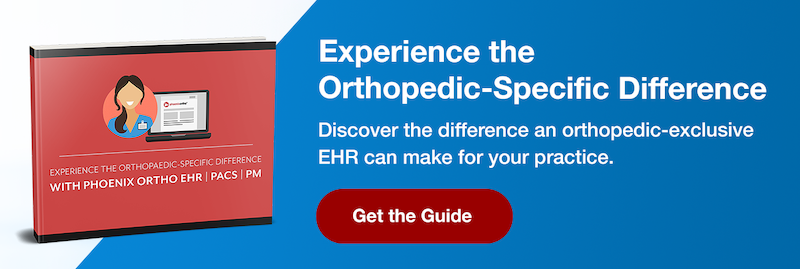Electronic Health Records software, otherwise known as EHR software, has become increasingly important to orthopaedic practice management (orthopedic practice management) over the last few years.
Since the turn of the century, as public acceptance and use of the internet has steadily increased, government agencies have begun to push for the transition from paper-based patient care records to electronic versions of those records.
For example, the Health Insurance Portability and Accountability Act (HIPAA), which can be traced back to 1996 according to HHS.gov, set forth provisions for “electronic health care transactions and code sets, unique health identifiers, and security.” Orthopaedic Practice Management software is becoming an increasingly prevalent driver for successful orthopaedic clinics across the country. So, the Phoenix Ortho team thought it might be a good idea to delve into the questions:
- What is EHR software?
- How is EHR software different from EMR software?
- Why is EHR software important to orthopaedic practices?
Defining Electronic Health Records Software
At first blush, the terms Electronic Medical Records (EMR) and Electronic Health Records (EHR) seem very similar. In fact, some organizations seem to use the two terms almost interchangeably. However, there is a distinct difference between the two—even though both could be considered types of electronic medical charting systems.
An EMR catalogs some basic information about the patient’s medical history, such as what diagnoses and treatments they’ve undergone (and by whom). Logging this important information electronically makes it easier for an orthopaedic specialist to retrieve it—improving the overall quality of patient care. EMRs put a laser-like focus on patient chart data.
An EHR software is, like its EMR counterpart, a kind of electronic charting system, logging treatment histories for future reference. However, what sets EHRs apart from EMRs is that the picture they provide of the patient’s medical history tends to be more inclusive, making it easier to transfer patient data to other care providers.
Electronic Health Records software programs tend to provide a more complete picture of a patient’s overall health as well, capturing and storing data beyond just the medical charting system.
The specific capabilities of these software programs, however, can vary from one EHR vendor to the next. There are many different types of EHR systems that provide a variety of medical charting system and PACS imaging system integrations. As such, it is important to ensure the EHR vendor clarifies exactly what their Electronic Health Records software can or cannot do.
Why Electronic Health Records Software Matters for Orthopaedic Practice Management
Using some type of Electronic Health Record system for your orthopaedic practice management can be important for several reasons, such as:
- Facilitating the Easy Transmission of Patient Data. In any health care specialization, it is critical to have ready access to patient information. Treatments applied by doctors or nurses with other specializations may affect the treatment options you are able to apply—and vice versa. Electronic charting systems that are designed to make it easy to share patient data between different specialists, such as EHR software, increase patient safety by putting the right information at your fingertips. Also, with clearly-legible digital text and information, patient charts are much easier to read than they are with handwritten ones.
- Less Duplication of Testing. When patient charts can be shared electronically, there is less need to constantly rerun medical tests on any given patient. The results of each test can be shared amongst an entire practice so Nurse A and Doctor B don’t mistakenly set up two rounds of the same tests for the same patient. This saves orthopaedic practices time and money on redundant testing, reduces stress on patients, and lessens the paperwork produced by the practice. This translates into reduced lab costs, happier patients, and fewer hours sorting through paperwork after the practice shuts down for the day.
- Increased Accuracy of Patient Diagnoses. A lack of information can easily lead to incorrect diagnoses of patient problems. With access to more patient data—especially test results, PACS imaging system files, and patient charts—orthopaedic specialists will have an easier time accurately diagnosing musculoskeletal issues in their patients (or be able to send the patient to another specialist if the issue isn’t musculoskeletal in nature).
- Better Charge Capture for Orthopaedic Services. To keep the doors open and be able to provide care for more people, orthopaedic clinics need to be able to collect payment for the services they render. Certain types of EHR systems make it easier for orthopaedic practices to perform charge capture by calculating the codes for billing as clinic personnel perform their work—i.e. in real time. This simplifies the billing process and helps to prevent issues with health insurance providers.
While general EHR software can help most practices simplify information sharing, for an orthopaedic practice to realize the maximum possible benefit of such software, it needs to be tailored to their needs. Orthopaedic practice management has different demands from general practitioners, and the type of EHR software orthopaedic practices use needs to reflect this fact.
With this in mind, Phoenix Ortho collaborated with a number of orthopaedic practitioners to create an orthopaedic-specific EHR software. This Electronic Health Records software is tailored to the needs of orthopaedic practices in a way that makes record-keeping and sharing as simple as possible—giving orthopaedic doctors all of the information they need and none of what they don’t.
If you want to learn more about orthopaedic EHR systems and how they can benefit your practice, please contact Phoenix Ortho today!
Schedule a 1:1
Get in touch with Phoenix Ortho to learn more about how you can save time, money, and mouse clicks with an orthopedic-specific EHR.





